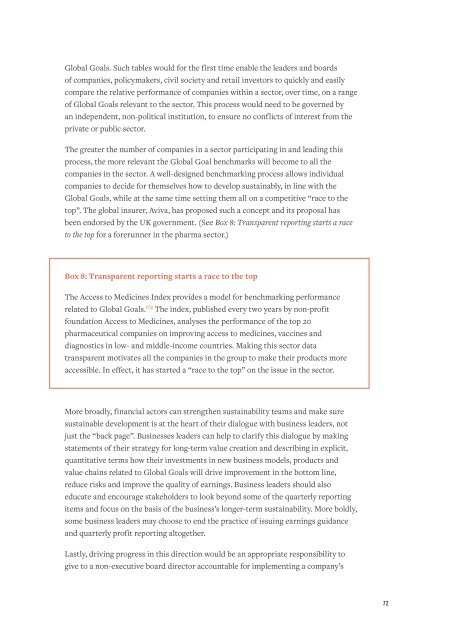BETTER BUSINESS BETTER WORLD
2jxE7K2
2jxE7K2
You also want an ePaper? Increase the reach of your titles
YUMPU automatically turns print PDFs into web optimized ePapers that Google loves.
Global Goals. Such tables would for the first time enable the leaders and boards<br />
of companies, policymakers, civil society and retail investors to quickly and easily<br />
compare the relative performance of companies within a sector, over time, on a range<br />
of Global Goals relevant to the sector. This process would need to be governed by<br />
an independent, non-political institution, to ensure no conflicts of interest from the<br />
private or public sector.<br />
The greater the number of companies in a sector participating in and leading this<br />
process, the more relevant the Global Goal benchmarks will become to all the<br />
companies in the sector. A well-designed benchmarking process allows individual<br />
companies to decide for themselves how to develop sustainably, in line with the<br />
Global Goals, while at the same time setting them all on a competitive “race to the<br />
top”. The global insurer, Aviva, has proposed such a concept and its proposal has<br />
been endorsed by the UK government. (See Box 8: Transparent reporting starts a race<br />
to the top for a forerunner in the pharma sector.)<br />
Box 8: Transparent reporting starts a race to the top<br />
The Access to Medicines Index provides a model for benchmarking performance<br />
related to Global Goals. 173 The index, published every two years by non-profit<br />
foundation Access to Medicines, analyses the performance of the top 20<br />
pharmaceutical companies on improving access to medicines, vaccines and<br />
diagnostics in low- and middle-income countries. Making this sector data<br />
transparent motivates all the companies in the group to make their products more<br />
accessible. In effect, it has started a “race to the top” on the issue in the sector.<br />
More broadly, financial actors can strengthen sustainability teams and make sure<br />
sustainable development is at the heart of their dialogue with business leaders, not<br />
just the “back page”. Businesses leaders can help to clarify this dialogue by making<br />
statements of their strategy for long-term value creation and describing in explicit,<br />
quantitative terms how their investments in new business models, products and<br />
value chains related to Global Goals will drive improvement in the bottom line,<br />
reduce risks and improve the quality of earnings. Business leaders should also<br />
educate and encourage stakeholders to look beyond some of the quarterly reporting<br />
items and focus on the basis of the business’s longer-term sustainability. More boldly,<br />
some business leaders may choose to end the practice of issuing earnings guidance<br />
and quarterly profit reporting altogether.<br />
Lastly, driving progress in this direction would be an appropriate responsibility to<br />
give to a non-executive board director accountable for implementing a company’s<br />
72


